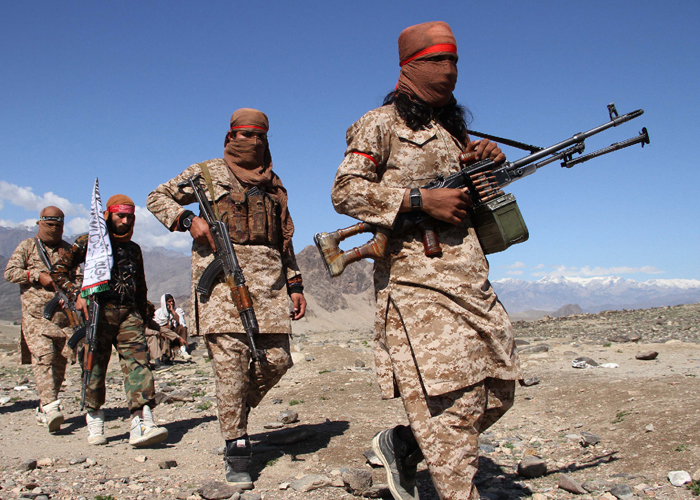The domination of extremist groups is becoming more probable in Afghanistan after the start of international troops withdrawal. Now, the next most fundamental concern and the question are if we accept that the extremist will dominate all or part of Afghanistan through dialogue or through war, what would be the situation for extremism in our geography? Will extremism intensify in the region? What is the Taliban’s relationship with other extremist and terrorist groups? Will the Taliban continue to link up with these groups? And if the Taliban take over the country, what image can there be of Afghan society? And finally, what is the global solution to religious extremism? To answer these questions, we must have a deeper glimpse at the relationship between Taliban and other radical groups in the region. According to local experts, the erosive war in Afghanistan will have the most dangerous consequences for the escalation and expansion of extremism and terrorism in Afghanistan and the region. The prolonged war and conflict have not only created new socio-political rifts in the country but also provided a good platform and systematic networks for the terrorist groups in the region. Religious extremists and terrorist groups are a threat to the region and to the world because they have deep economic, intellectual, and political links in the region. The recent UN Security Council report has clearly divulged this sure fact. Using violent and dogmatic approaches, they will not only exacerbate the backwardness, poverty, social and political inequality in many Muslim countries but will also act as a threatening factor in the world.
Although the extremist and terrorist groups have failed and repressed in Iraq, they are radically growing in Afghanistan. In Afghanistan, the situation seems more complicated than Iraq when we imagine the emergence of different radical groups combined with ethnic, cultural, and geopolitical features in the context of Afghanistan. While they indirectly serve as political tools, they have remained faithful to religious radicalism sanctifying themselves through religious justifications. Meanwhile, they have the dream to re-establish the emirate, caliphate, or any similar system in this land. Therefore, it may lead to long and unresolved conflicts in the world, especially in Muslim society, if the world fails to make a global consensus against extremist and terrorism group as a world challenge.
Unfortunately, the dogmatic approach of religious extremists has largely closed the door of dialogue and scientific solutions to the current world problem; otherwise, there is no irreconcilable contradiction between Islam and modern values such as freedom, tolerance, human rights, and other modern values. In other words, neither the contradiction between traditional values and modern values are confined to Islam and nor all traditions hinder social and economic advancement. In theory, many Hindu, Jewish, and Christian liberals also hold differing beliefs about the political system, while in world media a small extremist group represents nearly 1.8 billion moderate Muslims in the world.
Based on scientific studies carried out to explain the relations between tradition and development in China, Japan, Honkung, India, and Iran, tradition can play a positive role in social and political development. In Iran, According to Bano Azizi who carried out research on the role of tradition on the Iranian revolution and development, the Iranian religion and culture acted similar to Protestantism. It is flexible, rational, motivating, and more open comparing to other similar traditions and cultures in Islamic countries. Protestantism has played a very positive role in the renaissance and industrialization of European countries in the 16 and 17 centuries.
Therefore, all traditions and cultures do not necessarily hinder social and political development.
According to Bella, who is a very famous modernization theorist, religion can play a positive role in modernization. After carrying out some researches on Japanese religion, he concluded that TokoKawa religion like Protestantism has had a positive impact on Japanese modernization and development. His finding shows three features in Japanese religion that played a positive role in Japan’s development including hardworking, frugality, and legality of profit. Moreover, according to Japanese religion, the workers should do their job in the best possible quality regardless of receiving less or more salary. These religious teachings which are similar to Islamic advice slowly changed to a national culture in Japan and eventually led to today’s Japan development.
Given the above theories, moderate Islam does not hinder us from social and economic advancement and nor isolate us from the world. In fact, there are a lot of commonalities between the general spirit of Islam and modern values if it does not deviate from the right direction. Therefore, moderate Muslims instead of criticizing contents of human rights and liberal values should emphasize on the equal implementation of these values in the world. The moderate Muslims that form the majority of world Muslims should stress tolerance, brotherhood, and launching peaceful inter-culture dialogue so as to make the world a better place.
Based on Islamic teachings, we need to have an open society because there are always some valuable things in every culture to be learned. Out of the Muslim world, the people of Afghanistan support an open society specifically support the Islamic Republic of Afghanistan because of its moderate constitution, not because of its charismatic public servants or current ideal social order. The current constitution of Afghanistan while recognizing the international human rights and values, it pays respect to all cultures and religions. That’s why; it is called one of the best constitutions in the region and the best model for the Muslim community.
Home » Opinion » Religious Extremism: Roots, Contexts, and Solutions
Religious Extremism: Roots, Contexts, and Solutions
| Mohammad Zahir Akbari

